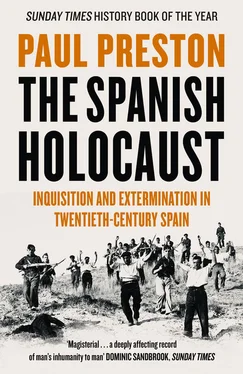Gil Robles admitted in his memoirs that the principal function of the CEDA was to make propaganda in parliament and to act as a shield for more violent groups. He quoted approvingly a comment that the perpetrators of right-wing terrorism in the spring of 1936 were ‘of the highest nobility and spiritual quality’. In a newpaper interview, he expressed approval of those who left the CEDA ‘to take the path of violence, believing it to be the way to solve national problems’. 82Almost immediately after the elections, the majority of one of key sections of the CEDA, the Derecha Regional Valenciana, had rejected the moderation of their leader, Luis Lucia, in favour of direct action. Under the leadership of the party’s secretary general, José María Costa Serrano, the DRV was collecting arms and organizing a clandestine militia. Links were established with the local Falange, Renovación Española and the Unión Militar Española. The DRV’s youth section drilled and held shooting practice. Throughout the spring, at least 15,000 members of JAP joined the Falange. Nothing was done to dissuade them and no efforts were made to recruit replacements. Many of those remaining with the CEDA were in active contact with groups committed to violence. And, when the war broke out, thousands of CEDA members joined the Carlists. 83
As confrontation in the countryside increased, fears of military conspiracy abounded. On 1 May, the moderate Socialist Indalecio Prieto laid out the problem in a speech at Cuenca, where there was a by-election. He went to Cuenca ‘worried about an imminent fascist uprising about which I had been making warnings to no avail other than to bring upon myself abuse and contempt’. It was thought prudent for him to have an armed escort provided by a group of the Socialist Youth known as the Motorizada. On the eve of his arrival, there had been fighting between local leftists and rightists and ashes were still blowing about from the burning of the casino, the local landowners’ club. 84He underlined the uncertainty provoked by disorder and the attendant dangers of a military coup. In a passionately patriotic speech, he laid out a plan for social justice based on well-planned economic growth to be implemented by a strong government. He denounced right-wing provocation and left-wing agitation – ‘what no nation can sustain is the attrition of its government and of its own economic vitality while being forced to live with unease, nerves and anxiety’. 85
An opportunity to strengthen the government arose in early May with the impeachment of Alcalá Zamora and his replacement as President by Manuel Azaña. It was widely hoped that a combination of a strong President and an equally strong Prime Minister could defend the Republic against military subversion. However, when Azaña asked him to form a government, Prieto made the tactical error of twice consulting the PSOE parliamentary group of which Largo Caballero was president. At meetings on 11 and 12 May, Largo Caballero and his followers opposed him and he capitulated quietly. Despite their opposition, Prieto could have formed a government with the support of the Republican parties and about a third of PSOE deputies. However, he was not prepared to split the PSOE. 86
By blocking the plan for a Prieto-led government, Largo Caballero had effectively destroyed the last chance of avoiding civil war. A powerful argument in favour of a coup used within the officer corps was that Largo Caballero, once in power, would dissolve the army. Prieto realized, as his rival apparently did not, that attempts at full-scale revolutionary social change would drive the middle classes to fascism and armed counter-revolution. Instead, Prieto, ever the pragmatist, was convinced that the answer was to restore order and accelerate reform. He had plans to remove unreliable military commanders, to reduce the power of the Civil Guard, to appoint a trusted officer as Director General of Security and to disarm the fascist terror squads. 87Largo Caballero prevented this and ensured that the strongest party of the Popular Front could not participate actively in using the apparatus of the state to defend the Republic. Azaña turned to his fellow Left Republican Santiago Casares Quiroga, who lacked the stature to deal with the problems he was called upon to solve. Prieto wrote later, ‘My role was thus reduced to constantly issuing warnings about the danger, and trying to ensure that, within our camp, naive and blind obstinacy, typical of a lamentable revolutionary infantilism, did not go on creating an atmosphere favourable to fascism because that was all that absurd acts of disorder brought about.’ 88
On 19 May, Casares Quiroga, Azaña’s successor as Prime Minister, presented his programme to the Cortes. Gil Robles responded with a virtuoso display of ambiguity. As on 15 April, an apparent appeal for moderation was in reality a justification of violence. Without mentioning names, he dwelled gloatingly on Azaña’s failure to get a broadly based Popular Front government under Prieto, stating that the Republican government was ‘reduced to the sad role, in relation to those groups [pointing to the Socialist benches], of being today the servant, tomorrow the victim’. Regarding Casares Quiroga’s declared hostility to fascism, he pointed out that disorder made fascist solutions relevant. While criticizing fascism in theory because of its foreign origins and its elements of state socialism, he justified the violence of those denounced as fascists, saying that there was no other way for them to defend their interests. He had nothing to say about how the present political disorder had been incited by the repressive and vindictive policies carried out by Radical–CEDA cabinets. Declaring that democracy was dead, he praised the trend to fascism as growing out of ‘a sense of patriotism, perhaps badly focused but profoundly hurt to see that the rhythm of politics is dictated not by great national interests but by you [turning to the Socialist deputies] with orders from Moscow’. It was an endorsement of the flight of the JAP masses into the Falange. Ending with a provocative challenge to Largo Caballero’s followers, he made a sarcastic reference to ‘you ferocious revolutionaries who do nothing but talk’. 89
Gil Robles’s denunciations of the breakdown of public order were seen on the left as a hypocritical attempt to discredit the government and justify a military coup. Those speeches also fed on the Falangist strategy of tension, directed from prison by José Antonio Primo de Rivera. After his arrest, his party went underground and the bloody cycle of provocation and reprisal was intensified dramatically. On 7 May, ripples of the Reyes funeral three weeks earlier could be seen in the murder, by a joint UME–Falangist squad, of Captain Carlos Faraudo, the Republican engineers officer who drilled the Socialist militias. The following day, there was a failed attempt on the life of the conservative Republican ex-Minister José María Álvarez Mendizábal. José Antonio told his friend Felipe Ximénez de Sandoval: ‘I don’t want any more Falangists in jail. I will use all my authority as Jefe Nacional [national leader] of the Falange to expel anyone who comes here without a good reason, such as having killed Azaña or Largo Caballero.’ The consequent disorder was the basis of the appeals of Gil Robles and Calvo Sotelo for military intervention. 90
Within the government apparatus, the man most concerned by the links between military conspiracy and Falangist violence was the Director General of Security, José Alonso Mallol. Since being appointed in February, Alonso Mallol had worked tirelessly to combat Falangist terrorism and to monitor the activities of hostile officers. One of his innovations was to place telephone taps on the houses and the barracks where the coup was being hatched. José Antonio’s correspondence with the conspirators was also intercepted. By May, Alonso Mallol was able to give President Azaña and the Prime Minister Casares Quiroga a list of more than five hundred conspirators whom he believed should be arrested immediately. Fearful of the possible reactions, Azaña and Casares failed to act and the coup went ahead. 91
Читать дальше












